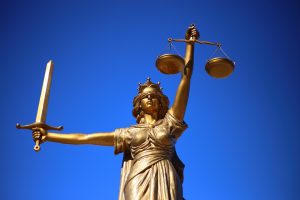
You Don’t Have to be a Supreme Court Justice to See a Thumb on the Scales By Charles Franklin
- By WRN Guest --
- 05 Jun 2020 --
 For those rational individuals who thought that the First Amendment kept government out of religious affairs, assured the people’s right to worship as they chose, and guaranteed the right to “peaceably assemble,” a recent decision by the U.S. Supreme Court may come as a shock. While most people of faith are cautious about gathering and resuming in-person church services during a pandemic, those trusting souls nevertheless felt that the First Amendment guaranteed the right to do so if they chose, virus be damned.
For those rational individuals who thought that the First Amendment kept government out of religious affairs, assured the people’s right to worship as they chose, and guaranteed the right to “peaceably assemble,” a recent decision by the U.S. Supreme Court may come as a shock. While most people of faith are cautious about gathering and resuming in-person church services during a pandemic, those trusting souls nevertheless felt that the First Amendment guaranteed the right to do so if they chose, virus be damned.
Justice Kavanaugh, in his dissent on South Bay United Pentecostal Church v. Newsom — a case which sought to overturn California Gov. Gavin Newsom’s executive orders restricting church attendance — said that California’s restrictions violate the First Amendment because the “basic constitutional problem is that comparable secular businesses are not subject to a 25 percent occupancy cap, including factories, offices, supermarkets, restaurants, retail stores, pharmacies, shopping malls, pet grooming shops, bookstores, florists, hair salons, and cannabis dispensaries.”
Unfortunately, Chief Justice John Roberts and the liberal members of SCOTUS disregarded the First Amendment, allowing California to restrict religious practice and peaceable assembly. Roberts, in fact, said “The notion that it is ‘indisputably clear’ that the Government’s limitations are unconstitutional seems quite improbable.”
I think it’s time to bring forth the First Amendment for another reading, for five justices who seem to embody – in a bad way – the old saw that “justice is blind.”
“Congress shall make no law respecting an establishment of religion,” reads the First Amendment, “or prohibiting the free exercise thereof; or abridging the freedom of speech, or of the press; or the right of the people peaceably to assemble, and to petition the Government for a redress of grievances.” That’s a very straightforward principle – you don’t need an attorney to interpret.
The California Constitution, however, has some exceptions, and says: “Free exercise and enjoyment of religion without discrimination or preference are guaranteed. This liberty of conscience does not excuse acts that are licentious or inconsistent with the peace or safety of the State.” Under that clause, one might suppose that “safety” would relate to restricting gatherings that might spread the Coronavirus, that California has it covered.
However, the First Amendment is not so nuanced, and says what it says. It doesn’t say, “unless a state or local executive order contradicts it” and in fact many state laws have been overturned by the Supreme Court because they violated the free exercise clause of the First Amendment. And it doesn’t say “except in the case of a pandemic.”
Since the Supreme Court sets precedents, if this ruling stands, then what kinds of restrictions might be imposed in the future? Once that foot gets in the door, who knows what could follow? In the name of health, we’ve already seen various governments decree that a child may not attend school without immunizations, that a healthy young person must buy health insurance, and now in the Supreme Court are a number of cases which would force business people to act contrary to their religious beliefs in the matter of birth control, abortion, homosexuality, etc.
Religious people, for the most part, are following the rules designed to slow the spread of the pandemic. No one really wants to contract the disease, or spread it to friends and family, and social distancing, limiting exposure to crowds, wearing masks, washing hands, etc. all make sense. But forcing churches, mosques, synagogues and temples to close is contrary to the First Amendment to the Constitution. You don’t have to be an attorney to understand the Bill of Rights and you don’t need to be a Supreme Court justice to see the thumb on the scales.
The Court is charged with “ensuring the American people the promise of equal justice under law and also functions as guardian and interpreter of the Constitution.” The very fact that Justice Kavanaugh’s appointment became a battleground and that the Court splits left and right on most issues is evidence of political bias on issues which should be decided solely by fundamental legal principles. In this case, the Court ignored freedom in the service of safety, ignored choice in favor of dictates, and ignored individual rights in favor of “we know what’s best for you.”


















